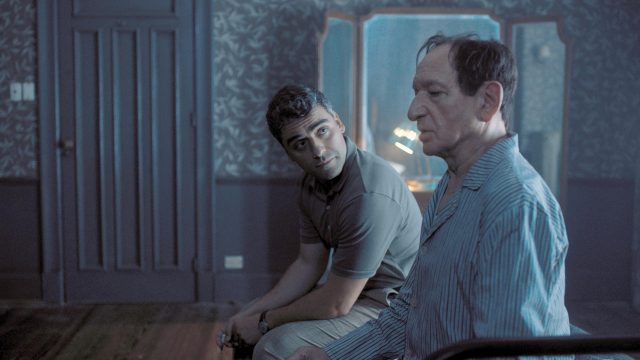Operation Finale: A Noble Failure, by Tyler Smith
It has long been my contention that, if a World War II or Holocaust movie produced and released today brings nothing particularly new to the genre, it serves very little purpose. In fact, I might even begin to see it as exploitative, capitalizing on the audience’s natural emotional response to such horrific imagery. However, upon watching Chris Weitz’s Operation Finale, which tells the familiar story of the abduction of Nazi officer Adolph Eichmann, I’m beginning to soften on that. While the film doesn’t bring anything particularly new to the large catalog of Holocaust movies, it is certainly a far cry from being exploitative. The film is a sincere exploration of survivor’s guilt and the inhumanity of the Nazis. Unfortunately, the film’s noble intentions don’t make up for an uneven approach to the material, which veers from reverent to sensationalistic and back again several times. The story itself may have power, with a strong, committed cast, but it never quite becomes a vital part of the conversation.
The story follows a number of Mossad agents in 1960, led by Peter Malkin (Oscar Isaac) as they discover the whereabouts of Adolph Eichmann (Ben Kingsley), the Nazi architect of the Final Solution. Malkin leads a team into Buenos Aires, where they plan to abduct Eichmann and spirit him away to Israel to stand trial for his crimes. As they execute this plan, they find that Eichmann is much more shrewd than they anticipated, playing mind games with his captors as he attempts to gain their sympathy.
This story leads to a number of interactions between Isaac and Kingsley that are more than a little reminiscent of the Hannibal Lector scenes in The Silence of the Lambs. The cunning older prisoner who retains control of the situation through his careful choice of words is something that we’ve seen countless times since Jonathan Demme’s iconic 1991 film, but Operation Finale seems to be borrowing the most liberally from it. This is to the film’s detriment, as these scenes begin to slip into pure entertainment and become more thrilling than harrowing. As written, Eichmann begins to come across like a clever action movie supervillain and less like the real life monster that he was. Ben Kingsley rightly brings a restrained realism to the part, but even his considerable talents can’t fully elevate the character beyond the melodramatic trappings of the screenplay.
I can understand the instinct to incorporate genre elements into an historical drama, but it requires a much steadier hand than Chris Weitz possesses. While he was undoubtedly inspired by the espionage elements of Steven Spielberg’s Munich or the suspense of Ben Affleck’s Argo, Weitz can’t quite maintain the tonal balance required for a film like this, and actually winds up echoing much breezier ensemble movies like Ocean’s Eleven.
Certainly the actors do what they can to lend weight to the film, and whatever moments of true power the film has come from them. There is one particularly memorable in which the Mossad agents sit around a table, listing off the people they lost in the Holocaust, until we finally arrive at soft-spoken Dani (Michael Benjamin Hernandez), who simply says that he’s the only one that made it. The group is quiet, and the audience is, too. In this moment, along with an extended scene of an underground Nazi rally in Buenos Aires, we are reminded that that, while World War II and the Holocaust have become familiar to us mostly through film and television, the inhumanity was all too real.
Which, I suppose, is one of the reasons that I’m glad Operation Finale exists, even if it is only occasionally memorable. It is impossible to watch the film and ignore just how monumentally barbaric the Holocaust was. That entire countries could justify the slaughter of millions of innocent people, and that other countries could be complicit in such things, is something that we are still struggling to comprehend.
And while this film can’t be considered a classic in the same way as films like Schindler’s List or The Pianist or Judgment at Nuremberg, it does genuinely seem to want to engage with Eichmann’s horrifying thought process. It wants to understand what makes a man like this tick, and allows him to speak for himself. This is a courtesy that the Nazis never extended to their enemies, so for even a largely mediocre film as this to hear out its villain is a nice reminder of how civilized society actually works. It is a surprisingly noble and lofty goal for a film as instantly forgettable as Operation Finale.































